Yu Suzuki ~ The Power To Never Give Up ~
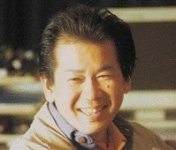
Yu Suzuki stands out as a profoundly innovative and imaginative force in the gaming sphere, spanning from Arcade Games to the monumental Shenmue series. His contributions have solidified a significant presence in the gaming history, owing to his pioneering vision. Through his groundbreaking work, Suzuki has not only pushed the boundaries of 3D technology, open-world gaming, and gameplay mechanics but has also reshaped and redefined entire genres, leaving an indelible mark on the industry.
In this blog post, I aim to delve into Yu's life, his illustrious career at SEGA, and various intriguing aspects I've stumbled upon online. Specifically, I'll explore the remarkable attribute that sets Suzuki apart: his unwavering determination, often referred to as "The Power To Never Give Up."
I dedicate this blog post to Yu Suzuki, and I sincerely hope that he gets the chance to read it someday.
~ Life ~
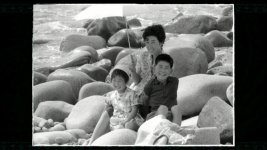
Yu Suzuki (right) with his mother Taka and young sister Yuka.
Yu Suzuki was born on June 10, 1958 in the Japanese town of Kamaishi, Iwate prefecture, he was raised there.
Yu Suzuki Majored in Electronic Science at Okayama University of Science.
Now I will share interesting informations about Yu Suzuki's life that I found on the Phantom River Stone blog.
As a child, Yu said he enjoyed building things like cars, spaceships and rocket-powered aircraft out of Lego blocks - the larger the better.
Living in a provincial area, he like to make up his own games. One of these was competing with friends to make balls out of dirt and dropping them to see whose would last the longest.
He'd even bake them to strengthen their surface.
Yu also played with kitset models, but he wouldn't make the object prescribed in the instructions. He'd collect all the individual parts in a large box of parts and create something of his own liking, for example attaching motors directly to the wheels to make an all-powerful car. Yu's parents scolded him for not building the models each kit was meant for.
"One time I built the model as instructed, and showed it to them. Then after that, I disassembled it all and tossed the parts into my parts box".
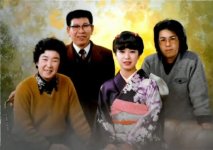
Yu Suzuki (right) with his mother Taka, father Yuzuru and young sister Yuka.
Yu's parents loved classical music, and his mother was a piano teacher. She taught Yu to play the piano and used to encourage him to take an interest in classical music too, but - as he noted children tend to do - he rebelled against this and jumped into rock music instead. He even replaced the strings in an acoustic guitar with steel strings and hooked up a microphone and speakers to play it like an electric guitar. At that time in Japan, electric guitars were associated with delinquent behavior so his parents didn't want to buy him one.
When Yu was young, he figured that not many people worked in jobs they enjoyed, meaning it was unlikely he would be able to find something he would actually like to do. Right from the start, he counted on being someone who would use his days off for hobbies. So he focused on jobs that would provide many days off, such as a teacher with summer and winter vacations. Then he considered being a dentist because you can choose your own days off. In the end, he went with SEGA because they offered two days off per week.
When Yu was in junior high school and thinking about his future career, he thought professions that had English names sounded really cool, like "illustrator' or "programmer", which fostered an aim to become one of those.
The profession of programmer in particular sounded appealing to him because he imagined it was derived from the prefix "pro" (which must be short for "professional") and the word "glamor" (which conjured up an image of a curvy lady)*. He wasn't sure if this was a career that men could do as well, but it sounded cool!
* Note from Switch: in Japanese the word "glamour" (グラマー) can have the meaning of voluptuous or full-bosomed, hence the association!
I recall reading somewhere that Yu Suzuki has a daughter. I believe she even makes an appearance in a video about YS NET. If I come across more details, I'll update this post.
~ SEGA ~
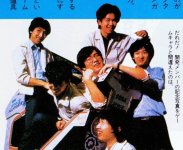
Yu Suzuki Joined Sega Enterprises in 1983.
Frequently dubbed Sega's counterpart to Shigeru Miyamoto, Yu Suzuki crafted many of SEGA seminal arcade games during his tenure.
Titles like Hang-On, Out Run, After Burner II, Virtua Fighter, Daytona USA, and Virtua Cop bear his creative stamp. In 2003, Suzuki earned induction as the sixth member of the Academy of Interactive Arts and Sciences' Hall of Fame. IGN recognized his influence by ranking him at #9 in their Top 100 Game Creators of All Time list. Moreover, in 2011, he was honored with the Pioneer Award at the Game Developers Choice Awards.
In September 2011, Yu Suzuki officially left SEGA to concentrate on his own development studio YS NET, while retaining an advisory role within SEGA.
His last position at SEGA was Creative Officer along with Toshihiro Nagoshi and Hiroshi Kataoka.
~ Shenmue ~
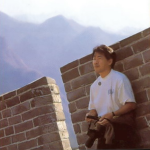
One aspect of Shenmue that I particularly adore is how Yu Suzuki drew inspiration for the story from his travels to China.
During his trips to China, Suzuki befriended Bajiquan Master Wu Lianzhi, who, to my understanding, served as the inspiration for Akira Yuki.
It feels like through Virtua Fighter and Shenmue, he's recounting the incredible experiences he had in China. And to me, that's truly remarkable and holds a special place.
In my view, Shenmue was his most ambitious project. The first game was released in 1999, but it was considered a failure in terms of sales.
Despite this setback, Yu Suzuki pressed on and released Shenmue II in 2001. However, he encountered numerous challenges in continuing the series thereafter. Nevertheless, he persevered, continuously seeking ways to bring Shenmue III to fruition. After an 18-year wait, Shenmue III finally hit the shelves in 2019.
This demonstrates an incredible resilience in Yu Suzuki—a determination to never give up. He steadfastly believes in the possibility of achieving his goals, even in the face of adversity. Many might have thrown in the towel, but Yu Suzuki never gave up. His unwavering commitment serves as a true inspiration to me.
~ YS NET ~
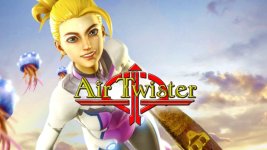
Yu Suzuki founded the independent studio YS NET Inc. in 2008 after his career at SEGA.
This is what YS Net Studio did so far.
Information
2023.11.10
Air Twister Released on Nintendo Switch, PlayStation 4, PlayStation 5,
Xbox One, and Xbox Series X/S
2022.06.24 -
Air Twister released on Apple Arcade
2019.11.19 -
Shenmue III released on PC and PS4
2017.08.17 -
Sign Global Publishing Deal for Shenmue III
2016.12.15 - PC version of Shenmue III Pre-order PRESS RELEASE
2015.06.16 -
The Shenmue III Kickstarter Project PRESS RELEASE
2015.06.15 -
Shenmue III official site open
2015.06.15 -
Shenmue III Kickstarter Project launch
~ The Future ~

The future of YS NET and Shenmue appears uncertain, but the fact that YS NET remains active is a positive sign. In one interview, Yu Suzuki mentioned that he's still making games.
If we don't receive any news about the future of Shenmue by 2024, I'll start to feel concerned. In such a scenario, I think it would be great for Yu Suzuki to share a message with the Shenmue Community to update us about the Shenmue situation.
Nevertheless, I still hold onto hope that we'll hear something about the future of Shenmue in 2024. Only time will tell what lies ahead for our beloved Shenmue Franchise.
~ Final Thoughts ~
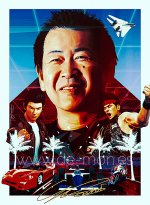
After an 18-year wait, Yu Suzuki finally released Shenmue III in 2019. However, the game received a mixed reaction, even among the Shenmue Community. Despite facing numerous challenges to continue the Shenmue series, Suzuki continues to demonstrate resilience in difficult times. He even faced hate after Shenmue III release but no signs that Yu-san
will give up about Shenmue.
Yu Suzuki maintains his belief that someday he will complete Shenmue in game format, and this determination is truly inspiring to me. His unwavering commitment to Shenmue, despite encountering so many obstacles, serves as a source of inspiration in my own life.
When he declares in the credits of Shenmue III that he will never give up on completing Shenmue, I truly believe him.
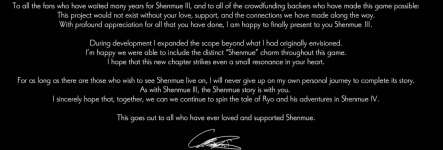
His message in the Shenmue III credits is truly inspiring and heartwarming, completing Shenmue is a personal journey
to him. It holds immense significance to him, and I genuinely believe that someday he will achieve this goal. I'm committed to supporting him throughout his personal journey.
Yu-san has deeply touched my heart in many ways, and I'm incredibly grateful for everything he has done. I admire him greatly, and he serves as an inspiration to me in countless ways. In fact, I'm even working on creating my own story with a Shenmue vibe.
Shenmue has helped me cope with the losses I've experienced in my life, including my Mother's death and much more. I'm truly thankful that Yu Suzuki, alongside his team at SEGA, created the masterpiece that is Shenmue. It's a game series that was ahead of its time and revolutionized the gaming industry. Shenmue is an unforgettable and unique experience, Shenmue will always be my all-time favorite video game series.
I will continue to support Yu Suzuki, and I firmly believe that he will complete Shenmue in game format, whether it's in Shenmue IV or Shenmue V.
Yu Suzuki possesses a sweet, remarkable and enduring power—the power to never give up.
~ Thank Yu For Everything. ~
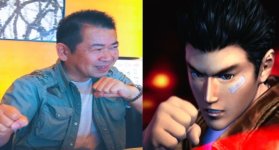
Now, I'd love to hear your thoughts. What do you all think about Yu Suzuki's career? Which games by Yu Suzuki are your favorites? Please share your thoughts in the comments below. Thank you all for taking the time to read, and remember to cherish your friends and loved ones. Until next time, bye bye. ~ Hikari ~ (Hiki)
~ Source and Credits ~
 www.phantomriverstone.com
www.phantomriverstone.com

 shenmue.fandom.com
shenmue.fandom.com
 www.ysnet.games
www.ysnet.games

 blog.adafruit.com
blog.adafruit.com

Yu Suzuki stands out as a profoundly innovative and imaginative force in the gaming sphere, spanning from Arcade Games to the monumental Shenmue series. His contributions have solidified a significant presence in the gaming history, owing to his pioneering vision. Through his groundbreaking work, Suzuki has not only pushed the boundaries of 3D technology, open-world gaming, and gameplay mechanics but has also reshaped and redefined entire genres, leaving an indelible mark on the industry.
In this blog post, I aim to delve into Yu's life, his illustrious career at SEGA, and various intriguing aspects I've stumbled upon online. Specifically, I'll explore the remarkable attribute that sets Suzuki apart: his unwavering determination, often referred to as "The Power To Never Give Up."
I dedicate this blog post to Yu Suzuki, and I sincerely hope that he gets the chance to read it someday.
~ Life ~

Yu Suzuki (right) with his mother Taka and young sister Yuka.
Yu Suzuki was born on June 10, 1958 in the Japanese town of Kamaishi, Iwate prefecture, he was raised there.
Yu Suzuki Majored in Electronic Science at Okayama University of Science.
Now I will share interesting informations about Yu Suzuki's life that I found on the Phantom River Stone blog.
As a child, Yu said he enjoyed building things like cars, spaceships and rocket-powered aircraft out of Lego blocks - the larger the better.
Living in a provincial area, he like to make up his own games. One of these was competing with friends to make balls out of dirt and dropping them to see whose would last the longest.
He'd even bake them to strengthen their surface.
Yu also played with kitset models, but he wouldn't make the object prescribed in the instructions. He'd collect all the individual parts in a large box of parts and create something of his own liking, for example attaching motors directly to the wheels to make an all-powerful car. Yu's parents scolded him for not building the models each kit was meant for.
"One time I built the model as instructed, and showed it to them. Then after that, I disassembled it all and tossed the parts into my parts box".

Yu Suzuki (right) with his mother Taka, father Yuzuru and young sister Yuka.
Yu's parents loved classical music, and his mother was a piano teacher. She taught Yu to play the piano and used to encourage him to take an interest in classical music too, but - as he noted children tend to do - he rebelled against this and jumped into rock music instead. He even replaced the strings in an acoustic guitar with steel strings and hooked up a microphone and speakers to play it like an electric guitar. At that time in Japan, electric guitars were associated with delinquent behavior so his parents didn't want to buy him one.
When Yu was young, he figured that not many people worked in jobs they enjoyed, meaning it was unlikely he would be able to find something he would actually like to do. Right from the start, he counted on being someone who would use his days off for hobbies. So he focused on jobs that would provide many days off, such as a teacher with summer and winter vacations. Then he considered being a dentist because you can choose your own days off. In the end, he went with SEGA because they offered two days off per week.
When Yu was in junior high school and thinking about his future career, he thought professions that had English names sounded really cool, like "illustrator' or "programmer", which fostered an aim to become one of those.
The profession of programmer in particular sounded appealing to him because he imagined it was derived from the prefix "pro" (which must be short for "professional") and the word "glamor" (which conjured up an image of a curvy lady)*. He wasn't sure if this was a career that men could do as well, but it sounded cool!
* Note from Switch: in Japanese the word "glamour" (グラマー) can have the meaning of voluptuous or full-bosomed, hence the association!
I recall reading somewhere that Yu Suzuki has a daughter. I believe she even makes an appearance in a video about YS NET. If I come across more details, I'll update this post.
~ SEGA ~

Yu Suzuki Joined Sega Enterprises in 1983.
Frequently dubbed Sega's counterpart to Shigeru Miyamoto, Yu Suzuki crafted many of SEGA seminal arcade games during his tenure.
Titles like Hang-On, Out Run, After Burner II, Virtua Fighter, Daytona USA, and Virtua Cop bear his creative stamp. In 2003, Suzuki earned induction as the sixth member of the Academy of Interactive Arts and Sciences' Hall of Fame. IGN recognized his influence by ranking him at #9 in their Top 100 Game Creators of All Time list. Moreover, in 2011, he was honored with the Pioneer Award at the Game Developers Choice Awards.
In September 2011, Yu Suzuki officially left SEGA to concentrate on his own development studio YS NET, while retaining an advisory role within SEGA.
His last position at SEGA was Creative Officer along with Toshihiro Nagoshi and Hiroshi Kataoka.
~ Shenmue ~

One aspect of Shenmue that I particularly adore is how Yu Suzuki drew inspiration for the story from his travels to China.
During his trips to China, Suzuki befriended Bajiquan Master Wu Lianzhi, who, to my understanding, served as the inspiration for Akira Yuki.
It feels like through Virtua Fighter and Shenmue, he's recounting the incredible experiences he had in China. And to me, that's truly remarkable and holds a special place.
In my view, Shenmue was his most ambitious project. The first game was released in 1999, but it was considered a failure in terms of sales.
Despite this setback, Yu Suzuki pressed on and released Shenmue II in 2001. However, he encountered numerous challenges in continuing the series thereafter. Nevertheless, he persevered, continuously seeking ways to bring Shenmue III to fruition. After an 18-year wait, Shenmue III finally hit the shelves in 2019.
This demonstrates an incredible resilience in Yu Suzuki—a determination to never give up. He steadfastly believes in the possibility of achieving his goals, even in the face of adversity. Many might have thrown in the towel, but Yu Suzuki never gave up. His unwavering commitment serves as a true inspiration to me.
~ YS NET ~

Yu Suzuki founded the independent studio YS NET Inc. in 2008 after his career at SEGA.
This is what YS Net Studio did so far.
Information
2023.11.10
Air Twister Released on Nintendo Switch, PlayStation 4, PlayStation 5,
Xbox One, and Xbox Series X/S
2022.06.24 -
Air Twister released on Apple Arcade
2019.11.19 -
Shenmue III released on PC and PS4
2017.08.17 -
Sign Global Publishing Deal for Shenmue III
2016.12.15 - PC version of Shenmue III Pre-order PRESS RELEASE
2015.06.16 -
The Shenmue III Kickstarter Project PRESS RELEASE
2015.06.15 -
Shenmue III official site open
2015.06.15 -
Shenmue III Kickstarter Project launch
~ The Future ~

The future of YS NET and Shenmue appears uncertain, but the fact that YS NET remains active is a positive sign. In one interview, Yu Suzuki mentioned that he's still making games.
If we don't receive any news about the future of Shenmue by 2024, I'll start to feel concerned. In such a scenario, I think it would be great for Yu Suzuki to share a message with the Shenmue Community to update us about the Shenmue situation.
Nevertheless, I still hold onto hope that we'll hear something about the future of Shenmue in 2024. Only time will tell what lies ahead for our beloved Shenmue Franchise.
~ Final Thoughts ~

After an 18-year wait, Yu Suzuki finally released Shenmue III in 2019. However, the game received a mixed reaction, even among the Shenmue Community. Despite facing numerous challenges to continue the Shenmue series, Suzuki continues to demonstrate resilience in difficult times. He even faced hate after Shenmue III release but no signs that Yu-san
will give up about Shenmue.
Yu Suzuki maintains his belief that someday he will complete Shenmue in game format, and this determination is truly inspiring to me. His unwavering commitment to Shenmue, despite encountering so many obstacles, serves as a source of inspiration in my own life.
When he declares in the credits of Shenmue III that he will never give up on completing Shenmue, I truly believe him.

His message in the Shenmue III credits is truly inspiring and heartwarming, completing Shenmue is a personal journey
to him. It holds immense significance to him, and I genuinely believe that someday he will achieve this goal. I'm committed to supporting him throughout his personal journey.
Yu-san has deeply touched my heart in many ways, and I'm incredibly grateful for everything he has done. I admire him greatly, and he serves as an inspiration to me in countless ways. In fact, I'm even working on creating my own story with a Shenmue vibe.
Shenmue has helped me cope with the losses I've experienced in my life, including my Mother's death and much more. I'm truly thankful that Yu Suzuki, alongside his team at SEGA, created the masterpiece that is Shenmue. It's a game series that was ahead of its time and revolutionized the gaming industry. Shenmue is an unforgettable and unique experience, Shenmue will always be my all-time favorite video game series.
I will continue to support Yu Suzuki, and I firmly believe that he will complete Shenmue in game format, whether it's in Shenmue IV or Shenmue V.
Yu Suzuki possesses a sweet, remarkable and enduring power—the power to never give up.
~ Thank Yu For Everything. ~

Now, I'd love to hear your thoughts. What do you all think about Yu Suzuki's career? Which games by Yu Suzuki are your favorites? Please share your thoughts in the comments below. Thank you all for taking the time to read, and remember to cherish your friends and loved ones. Until next time, bye bye. ~ Hikari ~ (Hiki)
~ Source and Credits ~
Phantom River Stone
A blog on the Shenmue series of games from Yu Suzuki with a mission to translate articles, videos and updates for English-speaking fans.

Shenmue Wiki
YS NET Inc.
Official site of YS NET Inc., an independent development studio founded by innovative game creator Yu Suzuki in 2008.
 www.ysnet.games
www.ysnet.games

Space Harrier – Developer Interview: Yu Suzuki – Designer
Fun read interview with video game designer Yu Suzuki, from shmuplations. In this collection of decade-spanning interviews, former and current Sega AM2 members discuss the making of Sega’s classic …
 blog.adafruit.com
blog.adafruit.com
Last edited:
